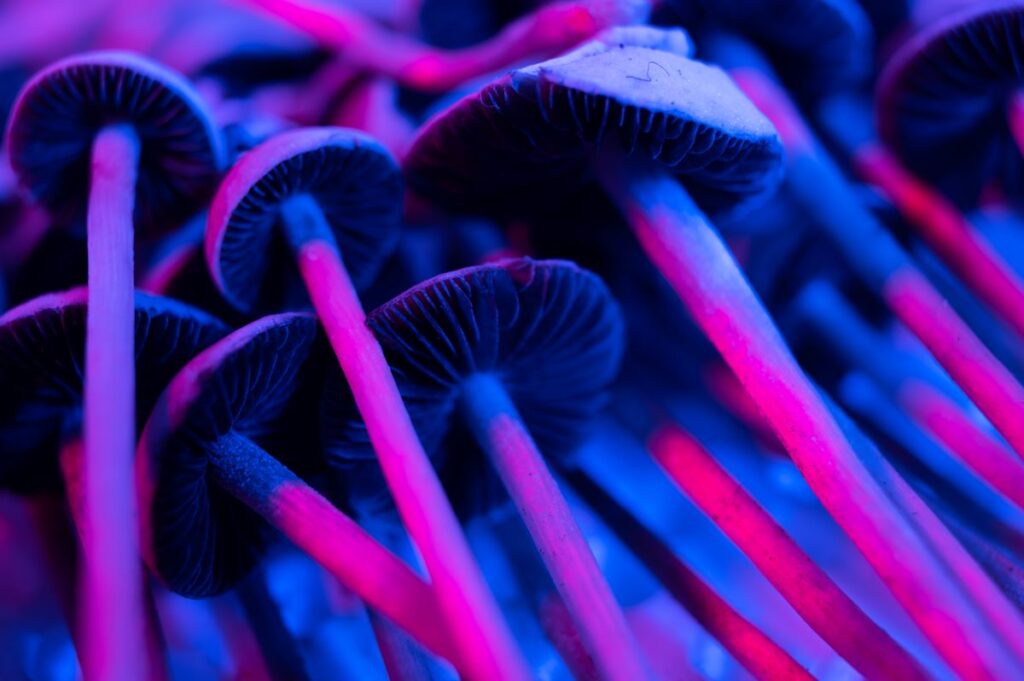Do ‘Shrooms’ hold the key to mental health treatments?

By Gabrielle Finora and the Team at LCWNS
What is Psilocybin and How Does it Work?
Psilocybin is the active chemical found in over 100 types of psychedelic mushrooms. When taken orally, people feel distorted senses and sights. This happens because psilocybin binds to serotonin receptors in the brain, which are like locks that control our sensory experiences. This is how we see hallucinations when using psychedelics. Psilocybin also has effects on other brain chemicals like dopamine and glutamate. Repeated use can change DNA and how the brain works over time.
Psilocybin is the most commonly used psychedelic in practice. Doses usually consist of one to three high doses of the isolated compound, about 25–30 mg. A therapist monitors the person throughout the entire session. After a few sessions, people often report profound positive changes in their values, perspectives, and beliefs, increasing their well-being, openness to experiences, and cognitive flexibility.
Psilocybin and Mental Health
Experts suggest that psilocybin can be helpful for those living with mental health conditions, such as depression, anxiety, obsessive-compulsive disorder (OCD), post-traumatic stress disorder (PTSD), and eating disorders. Psilocybin can increase emotional and brain network plasticity, which, in turn, can improve mental health over time. Repeated therapy sessions can help reroute brain networks for long-lasting results, including reduced suicidal ideation, anxiety, and intrusive thoughts, and improved mood and positive attitudes.
There is a concern that using psychedelics can worsen existing mental health conditions, however, research shows that is not the case. In a study of 135,095 random adults in the United States, with 19,299 psychedelic users, no association existed between lifetime psychedelic use and worsened mental health symptoms.
Research on Psilocybin and Eating Disorders: What We Know
As of 2024, there are few successful treatments for eating disorders. New research is exploring the effects of psilocybin on anorexia nervosa (AN), but little is known about its impact on buliemia nervosa (BN) and binge-eating disorder (BED).
Anorexia Nervosa and Psilocybin
For many, AN is a life-long condition with no successful treatments and no medications approved by the United States Food and Drug Administration. Experts predict that less than half of patients reach full recovery, with relapse rates of nearly 50%. Stagnant clinical study outcomes have signaled a “crisis in care”, according to Dr. Walter Kaye and Dr. Cynthia Bulik.
In 1959, a case study monitored a single woman with AN who received two doses of psilocybin by injection. After both injections, she experienced a psychological breakthrough, in which she vividly remembered memories from her childhood. They gave rise to the reason behind the beginning of her illness. She saw significant improvements in her mood, weight gain, and awareness of her disorder, although the results did not last through the year. This study is the first of its kind to measure the effects of psilocybin on AN and it was the last until recently due to the Controlled Substance Act (CSA) in 1970 implemented by the “War on Drugs” campaign.
More recently, to test the safety, tolerability, and feasibility of the drug, ten adult females with AN or pAN (partial remission) participated in a study in which they received one, 25mg dose of synthetic psilocybin followed by psychological support. No significant results were found except for low blood sugar in two people, indicating that psilocybin is a safe and tolerable treatment for females with AN. This study paves the way for future studies for AN and other conditions.
The Future of Psilocybin
For now, psychedelics, including psilocybin, remain illegal for the general public. Clinical studies can still use the substance for research purposes. Results from these studies show very positive signs that substances like psilocybin might be promising treatments for those struggling with treatment-resistant mental health conditions, including eating disorders. In an interview with Knowable Magazine, Robert Mikos, an expert on drug law at Vanderbilt University Law School in Tennessee, says that framing psychedelics use as “medical” helps change the public’s opinion, as that was a tactic for the legalization of medical marijuana. Still, the path to legalization will likely need to be paved through the states rather than the federal government.
Sources:
Daniel, J., & Haberman, M. (2018). Clinical potential of psilocybin as a treatment for mental health conditions. The mental health clinician, 7(1), 24–28. https://doi.org/10.9740/mhc.2017.01.024
Kaye WH, Bulik CM. Treatment of Patients With Anorexia Nervosa in the US—A Crisis in Care. JAMA Psychiatry. 2021;78(6):591–592. doi:10.1001/jamapsychiatry.2020.4796
Peck, S.K., Shao, S., Gruen, T. et al. Psilocybin therapy for females with anorexia nervosa: a phase 1, open-label feasibility study. Nat Med 29, 1947–1953 (2023). https://doi.org/10.1038/s41591-023-02455-9
Seal, B. (2024, March 14). Psychedelic drugs and the law: What’s next? Knowable Magazine | Annual Reviews. https://knowablemagazine.org/content/article/society/2024/psychedelic-drugs-and-the-law-whats-next
Verroust, V., Zafar, R., & Spriggs, M. J. (2021, September 28). Psilocybin in the treatment of anorexia nervosa: The English transition of a French 1959 case study. Annales Médico-psychologiques, revue psychiatrique. https://www.sciencedirect.com/science/article/pii/S0003448721002468







